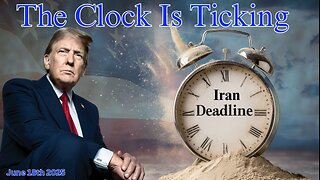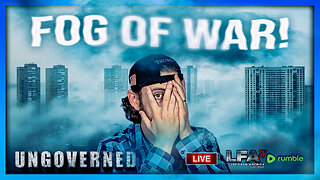Premium Only Content

13 Essential Jewish American Films
13 Essential Jewish American Films
What makes a movie Jewish? If the filmmakers or the cast are Jewish, is that enough, or must there be Jewish subject matter? Do religious artifacts — a yarmulke, a tallit — need to make an appearance? What about movies that aren’t explicitly Jewish but just feel Jewish? Debate is essential to Judaism, both religiously and culturally — the saying goes “two Jews, three opinions” — and nowhere is that truer than at the movies. Because American Jews have a long, rich onscreen storytelling tradition, there are far more Jewish cinematic cultural touchstones than could ever fit on one list....
What makes a movie Jewish? If the filmmakers or the cast are Jewish, is that enough, or must there be Jewish subject matter? Do religious artifacts — a yarmulke, a tallit — need to make an appearance? What about movies that aren’t explicitly Jewish but just feel Jewish? Debate is essential to Judaism, both religiously and culturally — the saying goes “two Jews, three opinions” — and nowhere is that truer than at the movies. Because American Jews have a long, rich onscreen storytelling tradition, there are far more Jewish cinematic cultural touchstones than could ever fit on one list. Add to this the fact that there are many ways to be Jewish — levels of observance, Sephardic and Ashkenazi and Mizrahi, etc. — and narrowing the Jewish American filmic canon down to ten (or even 13) feels nearly impossible. The following collection, presented in chronological order, spotlights both foundational works and underappreciated gems — and almost certainly omits some of your favorites. (Where are the Safdies? Where is Chosen ? I know.) Argue away. To Be or Not to Be (1942, remade in 1983) 96% To Be or Not to Be (1942) 55% To Be or Not to Be (1983) Carole Lombard and Jack Benny, 1942. Courtesy Everett Collection. Jewish director Ernst Lubitsch, a German-American master who left his home country for Hollywood well before World War II, was revered in his time for classics like The Shop Around the Corner (later remade into You’ve Got Mail ). But To Be or Not to Be , a satire about a squabbling theater troupe that must prevent a Nazi spy from destroying the Polish resistance, wasn’t universally appreciated in its time. Eighty-odd years later, the movie, which feels a bit like a Jewish Casablanca , holds up brilliantly. Shot during wartime, it’s still genuinely funny today, and its ethos — of criticizing censorship and dealing with tragedy through dark humor — is deeply Jewish. It features Jewish film and radio star Jack Benny (born Benjamin Kubelsky), and Shylock’s speech from Shakespeare’s The Merchant of Venice plays a key role in the plot. The film was remade in 1983 with Mel Brooks in the leading role, the only film he starred in that he didn’t direct; he’s said it’s his favorite of his Brooksfilm movies. Fiddler on the Roof (1971) 80% Fiddler on the Roof (1971) Chaim Topol in Fiddler on the Roof (1971). Courtesy Everett Collection. The loss of star Chaim Topol earlier this year had many revisiting this musical classic. Though set in the fictional Ukrainian town of Anatevka at the turn of the 20th century, Fiddler deals with themes central to Judaism today — namely, how to balance tradition and modernity — and ends as its characters emigrate to America. Based on a series of Yiddish stories by Jewish author Sholem Aleichem, the movie is responsible for many Americans’ collective images of shtetl life (and a lot of childhood nightmares featuring Fruma Sarah). This funny, moving film, anchored by stellar performances across the board, is so well-loved that it inspired a 2022 documentary about its making, Fiddler’s Journey to the Big Screen . Annie Hall (1977) 97% Annie Hall (1977) Diane Keaton and Woody Allen in Annie Hall (1977). Courtesy Everett Collection. The details of Woody Allen’s personal life have called into question his place on any list. But it’s nearly impossible to talk about Jewish American movies without acknowledging him — and, specifically, Annie Hall . The Best Picture Academy Award-winner brought a neurotic Jewish protagonist into the mainstream, arguably for the first time; it has influenced most subsequent Jewish movies and has forever tied the American Jewish aesthetic to anxiety and New York. The scene in which Alvy Singer imagines himself as an Orthodox Jew at a WASP-y lunch stands out as particularly indelible, capturing the American Jew’s perception of himself a...
-
 1:13:06
1:13:06
Dear America
2 hours agoWhat Would WWIII ACTUALLY Look Like… It Looks Like NUCLEAR WAR!
46.1K92 -
 LIVE
LIVE
PudgeTV
3 hours ago🟠 Gaming on Rumble | Star Wars Battlefront 2 | Story Campaign or Online Play?
1,876 watching -
 LIVE
LIVE
Badlands Media
7 hours agoBadlands Daily: June 18, 2025
3,839 watching -

Randi Hipper
41 minutes agoCRYPTO BILL, GENIUS ACT PASSES THE SENATE! LATEST BITCOIN NEWS
-
 1:03:34
1:03:34
Greg Hunter's USAWatchdog.com
10 hours agoNeocons Dragging Trump into WWIII – Martin Armstrong
14.5K17 -
![🔴[LIVE TRADING] FOMC DAY MARKET CHAOS || The MK Show](https://1a-1791.com/video/fww1/6f/s8/1/z/P/s/U/zPsUy.0kob.1-small-The-MK-Show-June-18th.jpg) LIVE
LIVE
Matt Kohrs
8 hours ago🔴[LIVE TRADING] FOMC DAY MARKET CHAOS || The MK Show
1,143 watching -
 LIVE
LIVE
Wendy Bell Radio
5 hours agoThe Clock Is Ticking
9,124 watching -
 LIVE
LIVE
LFA TV
13 hours agoLFA TV ALL DAY STREAM - WEDNESDAY 6/18/25
3,771 watching -
 LIVE
LIVE
FyrBorne
13 hours ago🔴Warzone Sniping: The Fight Vs Cheaters Continues (Where is Ricochet?)
50 watching -
 1:10:47
1:10:47
Game On!
16 hours ago $1.85 earnedThe Florida Panthers Are BACK TO BACK Champs! Florida Is Hockey!
55.1K2